新概念第二册第8课教案
新概念第二册第8课课件
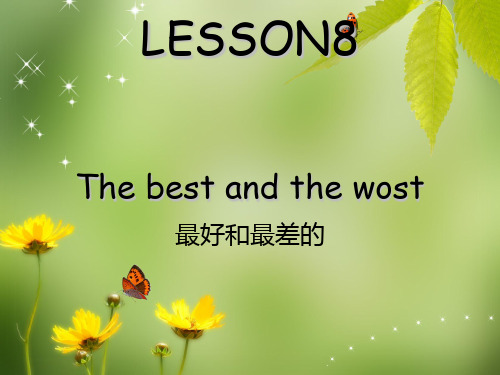
to one's surprise detective steal keep guard airport airfield parcel
Do you know about these fashionable words?
偷菜
施肥
除草
stealing vegetables fertilization weeding
Joe Sanders has the most beautiful garden in our town. Nearly everybody enters for 'The Nicest Garden Competition' each year, but Joe wins every time. Bill Frith's garden is larger than Joe's. Bill works harder than Joe and grows more flowers and vegetables, but Joe's garden is more interesting. He has made neat paths and has built a wooden bridge over a pool. I like gardens too, but I do not like hard work. Every year I enter for the garden competition too, and I always win a little prize for the worst garden in the town!
I win. I lose. (输了) ② vt. 赢得…… win something 后面往往是奖品,不能接对手
新概念英语第二册课文+练习-Lesson-8
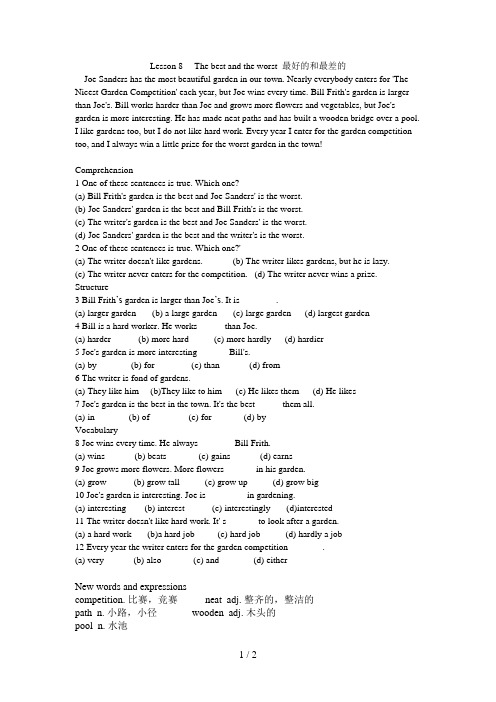
Lesson 8 The best and the worst 最好的和最差的Joe Sanders has the most beautiful garden in our town. Nearly everybody enters for 'The Nicest Garden Competition' each year, but Joe wins every time. Bill Frith's garden is larger than Joe's. Bill works harder than Joe and grows more flowers and vegetables, but Joe's garden is more interesting. He has made neat paths and has built a wooden bridge over a pool.I like gardens too, but I do not like hard work. Every year I enter for the garden competition too, and I always win a little prize for the worst garden in the town!Comprehension1 One of these sentences is true. Which one?(a) Bill Frith's garden is the best and Joe Sanders' is the worst.(b) Joe Sanders' garden is the best and Bill Frith's is the worst.(c) The writer's garden is the best and Joe Sanders' is the worst.(d) Joe Sanders' garden is the best and the writer's is the worst.2 One of these sentences is true. Which one?'(a) The writer doesn't like gardens. (b) The writer likes gardens, but he is lazy.(c) The writer never enters for the competition. (d) The writer never wins a prize. Structure3 Bill Frith’s garden is larger than Joe’s. It is________.(a) larger garden (b) a large garden (c) large garden (d) largest garden4 Bill is a hard worker. He works _____ than Joe.(a) harder (b) more hard (c) more hardly (d) hardier5 Joe's garden is more interesting ______ Bill's.(a) by (b) for (c) than (d) from6 The writer is fond of gardens. ______(a) They like him (b)They like to him (c) He likes them (d) He likes7 Joe's garden is the best in the town. It's the best _____ them all.(a) in (b) of (c) for (d) byVocabulary8 Joe wins every time. He always _______ Bill Frith.(a) wins (b) beats (c) gains (d) earns9 Joe grows more flowers. More flowers ______ in his garden.(a) grow (b) grow tall (c) grow up (d) grow big10 Joe's garden is interesting. Joe is ________ in gardening.(a) interesting (b) interest (c) interestingly (d)interested11 The writer doesn't like hard work. It' s ______ to look after a garden.(a) a hard work (b)a hard job (c) hard job (d) hardly a job12 Every year the writer enters for the garden competition _______.(a) very (b) also (c) and (d) eitherNew words and expressionscompetition. 比赛,竞赛 neat adj. 整齐的,整洁的path n. 小路,小径 wooden adj. 木头的pool n. 水池。
新概念第二册lesson8教案

NEW CONCEPT ENGLISH SB2Lesson 8 Do you speak English? (NCE lesson 14)Teaching goals:1. Target languagea. Learn the following words and phrases:amusing experience leave village next town south drive wave ask sb. for a lift French reply same language apart from word not…at all neither s peak during journey nearly reach suddenly slowly soon himselfb. Learn some important sentences:①. I had an amusing experience last year.②. Neither of us spoke during the journey.③. After I had left a small village in the south of France, I drove on to the next town.2. Ability goalDevelop the students’ abilities to listen, s peak, read and write in English.3. Learning ability goalMake the students know about the writer’s an amusing experience.Teaching Important Points:1.How to improve the students’ reading ability.2.How to write a summary.Teaching Difficult Points:1. Help the students master some useful words and expressions.2. Help the students understand the text.3. Enable the students to use the sentence patterns correctly.Teaching Methods:1.Asking-and-answering activity to go through the text.2.Discussion before and after reading to make the students interested in what they will read and further understand what they have read.3.Careful-reading to get the detailed information in the text.4.Individual, pair or group work to make every student work in class.5. Listening and repeating method to improve the students’ pronunciation.Teaching Aids:1. a tape recorder2. multimediaTeaching Procedures:Step1. Greetings and RevisionCheck the homework.Step2. Lead-in1.Free talk with the students: Have you ever tried to talk to someone who didn’tknow your language? What happened?2.T: Now, please look at the pictures on the screen and answer the question: what doyou think is happening in the picture?(Individual work)T: Today we’re going to learn lesson 8 “Do you speak English?”.It is about a man who had an amusing experience last year .Step3. ListeningT: Now let’s listen to the tape. First we’ll learn some new words on the blackboard. (Write the new words on the blackboard.)Let the students listen to the tape twice and find the answers to the questions.Q1: Do they talk to each other?→No, they don’t.(Check the answers with the whole class after the students listen to the tape.)Step4. Reading1. Let the students read the text and have a discussion with the partners.(Pair work and Individual work)These questions are on the text. Write a complete sentence in answer to each question. Q1. What happen when the writer was driving to a town in French?→.A young man waved to the writer and asked for a lift.Q2. In which language did the young man reply to the writer’s greeting?→He replied in French.Q3. Does the writer speak any French or not?Q4. Why did neither of the speak during the journey?→. Because both of them thought the other was French and both of them knew little French.Q5.What did the young man say at the end of the journey?→He said very slowly: “Do you speak English?”.(Teacher goes among the students and collects the difficult points that the students can’t understand after having a discussion.)2. Deal with some language points. (on the screen)1)On the way; 在路上,在途中2)Wave to sb; 冲某人挥手3)ask sb for sth; 请求某人要求得到什么东西4) As soon as; 一….就。
新概念英语第二册第八课学习笔记
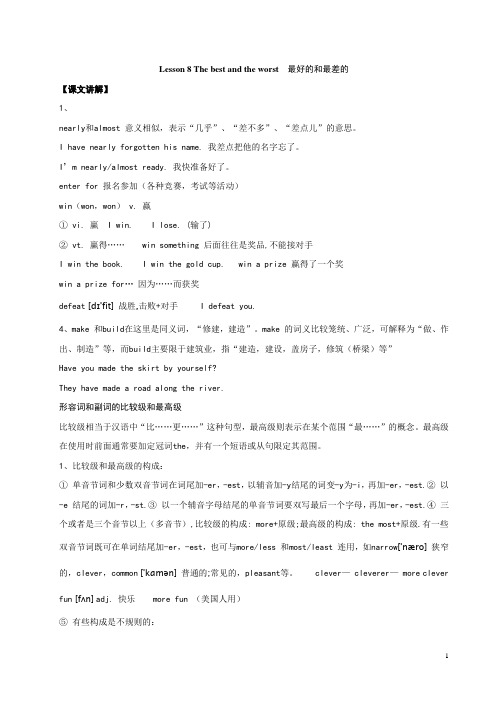
Lesson 8 The best and the worst 最好的和最差的【课文讲解】1、nearly和almost 意义相似,表示“几乎”、“差不多”、“差点儿”的意思。
I have nearly forgotten his name. 我差点把他的名字忘了。
I’m nearly/almost ready. 我快准备好了。
enter for 报名参加(各种竞赛,考试等活动)win(won,won)v. 赢①vi. 赢I win. I lose. (输了)②vt. 赢得……win something 后面往往是奖品,不能接对手I win the book. I win the gold cup. win a prize 赢得了一个奖win a prize for…因为……而获奖defeat [dɪ'fit]战胜,击败+对手I defeat you.4、make 和build在这里是同义词,“修建,建造”。
make 的词义比较笼统、广泛,可解释为“做、作出、制造”等,而build主要限于建筑业,指“建造,建设,盖房子,修筑(桥梁)等”Have you made the skirt by yourself?They have made a road along the river.形容词和副词的比较级和最高级比较级相当于汉语中“比……更……”这种句型,最高级则表示在某个范围“最……”的概念。
最高级在使用时前面通常要加定冠词the,并有一个短语或从句限定其范围。
1、比较级和最高级的构成:①单音节词和少数双音节词在词尾加-er,-est,以辅音加-y结尾的词变-y为-i,再加-er,-est.②以-e 结尾的词加-r,-st.③以一个辅音字母结尾的单音节词要双写最后一个字母,再加-er,-est.④三个或者是三个音节以上(多音节),比较级的构成: more+原级;最高级的构成: the most+原级.有一些双音节词既可在单词结尾加-er,-est,也可与more/less 和most/least 连用,如narrow['næro]狭窄的,clever,common ['kɑmən]普通的;常见的,pleasant等。
新概念英语第2册课程讲义Lesson8
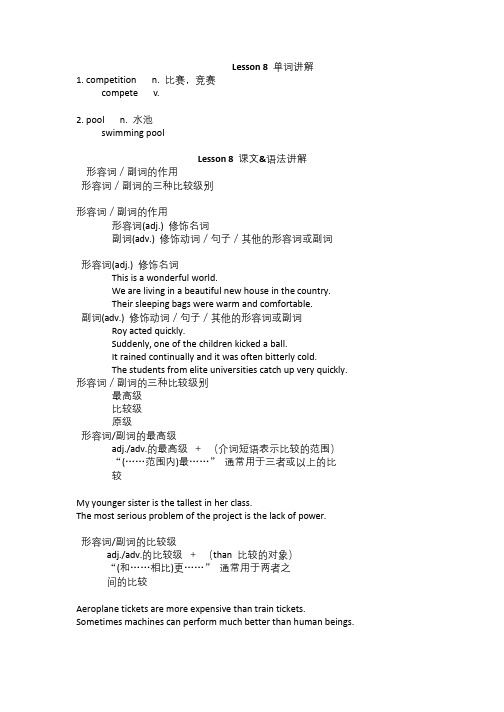
Lesson8单词讲解petition n.比赛,竞赛compete v.2.pool n.水池swimming poolLesson8课文&语法讲解形容词/副词的作用形容词/副词的三种比较级别形容词/副词的作用形容词(adj.)修饰名词副词(adv.)修饰动词/句子/其他的形容词或副词形容词(adj.)修饰名词This is a wonderful world.We are living in a beautiful new house in the country.Their sleeping bags were warm and comfortable.副词(adv.)修饰动词/句子/其他的形容词或副词Roy acted quickly.Suddenly,one of the children kicked a ball.It rained continually and it was often bitterly cold.The students from elite universities catch up very quickly.形容词/副词的三种比较级别最高级比较级原级形容词/副词的最高级adj./adv.的最高级+(介词短语表示比较的范围)“(……范围内)最……” 通常用于三者或以上的比较My younger sister is the tallest in her class.The most serious problem of the project is the lack of power.形容词/副词的比较级adj./adv.的比较级+(than比较的对象)“(和……相比)更……” 通常用于两者之间的比较Aeroplane tickets are more expensive than train tickets. Sometimes machines can perform much better than human beings.1.Joe Sanders has the most beautiful garden in our town.2.Nearly everybody enters for'The Nicest Garden Competition'each year,but Joe wins every time.3.Bill Frith's garden is larger than Joe's.Bill Frith's garden is larger than Joe's garden.Bill Frith's garden is larger than Joe.X4.Bill works harder than Joe and grows more flowers and vegetables,but Joe's garden is more interesting.5.Every year I enter for the garden competition too,and I always win a little prize for the worst garden in the town!Lesson8知识拓展本课重点:形容词/副词形容词副词的比较级/最高级形容词副词的比较级I am fatter than before.I am fatter than I was.I am fatter than I used to be.形容词副词的比较级The traffic block is more serious than before.The traffic block is more serious than it was.The traffic block is more serious than it used to be.形容词副词的比较级You are smarter than they think.The project took longer than I expected.形容词副词的比较级Bill’s garden is larger than Joe.Bill’s garden is larger than Joe’s.形容词副词的比较级The population of Beijing is larger than Tianjin.The population of Beijing is larger than that of Tianjin.形容词副词的比较级The visitors to London is more than Bath.The visitors to London is more than those to Bath.。
《新概念英语》第二册第8课

Lesson 81:Joe Sanders has the most beautiful garden in our town. Nearly everybody enters for 'The Nicest Garden Competition' each year, but Joe wins every time.1)形容词和副词的比较等级1>. 原级,也就是原形;2>. 比较级,表示“较……”或“更……”的意思(用于两者之间比较);3>. 最高级,表示“最……”的意思(用于三者或三者以上的比较)。
形容词、副词的比较级和最高级是如何构成的?1>. 单音节词和少数以-er,-ow结尾的双音节单词,比较级在后面加-er,最高级在后面加-est。
①单音节单词small→smaller→smallest short→shorter→shortesttall→taller→tallest great→greater→greatest②少数以-er,-ow结尾的双音节单词clever→cleverer→cleverest narrow→narrower→narrowest2>. 以不发音e结尾的单音节单词,比较级在原形后加-r,最高级在原级后加-st。
large→larger→largest nice→nicer→nicest able→abler→ablest3>. 以一个辅音字母结尾的闭音节(即:辅音+元音+辅音)单词中,先双写末尾的辅音字母,比较级加-er,最高级加-est。
big→bigger→biggesthot→hotter→hottestfat→fatter→fattest4>. 以“辅音字母+y”结尾的双音节词,把y改为i,比较级加-er,最高级加-est。
easy→easier→easiestheavy→heavier→heaviestbusy→busier→busiesthappy→happier→happiest5>. 其他双音节词和多音节词,比较级在前面加more,最高级在前面加most。
新概念英语第二册第8课课文详解及语法解析
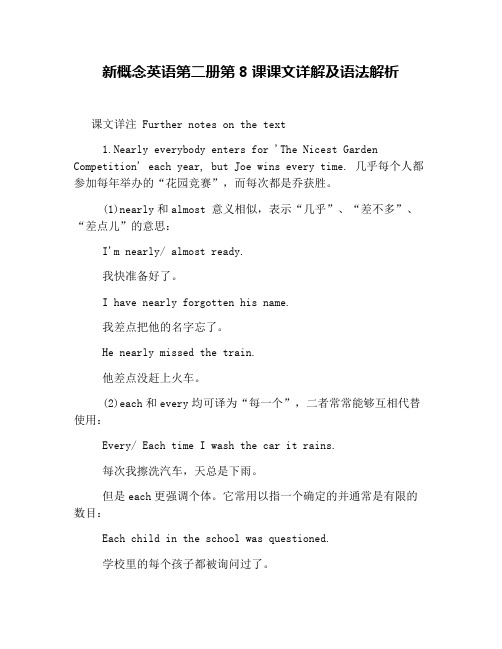
新概念英语第二册第8课课文详解及语法解析课文详注 Further notes on the text1.Nearly everybody enters for 'The Nicest Garden Competition' each year, but Joe wins every time. 几乎每个人都参加每年举办的“花园竞赛”,而每次都是乔获胜。
(1)nearly和almost 意义相似,表示“几乎”、“差不多”、“差点儿”的意思:I'm nearly/ almost ready.我快准备好了。
I have nearly forgotten his name.我差点把他的名字忘了。
He nearly missed the train.他差点没赶上火车。
(2)each和every均可译为“每一个”,二者常常能够互相代替使用:Every/ Each time I wash the car it rains.每次我擦洗汽车,天总是下雨。
但是each更强调个体。
它常用以指一个确定的并通常是有限的数目:Each child in the school was questioned.学校里的每个孩子都被询问过了。
every却不那么强调个体,常用来指一个大的、不确定的数目:Every child enjoys Christmas.所有的/每个孩子都喜欢过圣诞节。
另外,each既能够作形容词又能够作代词,但every只能作形容词:They each have a share.他们每人都有一份。
Each of us has his own work to do.我们每个人都有自己的工作要干。
2.Bill Frith's garden is larger than Joe's. 比尔·弗里斯的花园比乔的花园大。
名词加-'s表示所属关系,构成名词的所有格。
新概念2第8课课件
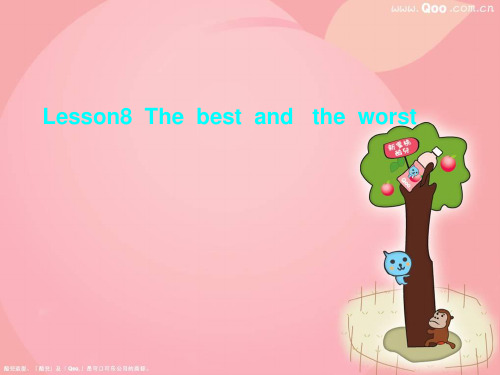
3) 重读闭音节、先双写最后一个辅音 字母再加 –er 或 –est
fat – fatter – fattest big – bigger – biggest thin – thinner – thinnest
4) 以辅音字母加 y 结尾变 y 为 i 加 –er 或 –est early – earlier – earliest easy – easier – easiest lucky – luckier – luckiest
bigger
biggest
• 4. 以辅音字母加-y 结尾的词,先把-y变为 i, 再 • easy easier easiest
部分形容词(副词)的比较级和最高级的不规则变化:
原级 good / well many / much
比较级 better more worse less
older/elder
fast – faster – fastest high – higher – highest clever – cleverer – cleverest
2) 以不发音字母 e 结尾加 –r 或 –st
fine – finer – finest late – later – latest nice – nicer – nicest
competition n. 比赛,竞赛 neat adj. 整齐的,整洁的 path n. 小路,小径 wooden adj. 木头的 pool n. 水池
★competition
n. 比赛,竞赛(暗地里的竞争)
race n. 比赛,竞赛car race match n. 比赛 football match
Lesson8 The best and the worst
- 1、下载文档前请自行甄别文档内容的完整性,平台不提供额外的编辑、内容补充、找答案等附加服务。
- 2、"仅部分预览"的文档,不可在线预览部分如存在完整性等问题,可反馈申请退款(可完整预览的文档不适用该条件!)。
- 3、如文档侵犯您的权益,请联系客服反馈,我们会尽快为您处理(人工客服工作时间:9:00-18:30)。
Lesson 8 The best and the worst
一、词汇:
petition n.比赛,竞赛。
与它有类似意义的还有match, game, race这些词。
下面我们来把这些词对比一下。
2.neat adj. 整齐的,整洁的不等于clean同义词有:tidy
3.path n. 小路,小径
同义词:street/ road
(扩展) 大家可能还记得“abroad国外的”这个单词,就可以巧记为:国外的AB大街。
4.wooden adj. 木头的
e.g.: I want to built a wooden house. 我想建一个木制的房子。
5.pool n. 水池,是人工的游泳池:swimming pool天然的叫池塘:pond
二、词组:
1.enter for 报名参加,只强调报名参加:take part in
扩展:大家要注意区分好这几个词:
2. over越过,超过。
同时over还有强调“跨过两端的一个距离”的意思。
扩展:这里有一个口诀来帮助大家记住over介词的用法
over under正上下
above below则不然
三、句子
1.Nearly everybody enters for 'The Nicest Garden Competition' each year, but Joe wins every time. 几乎每个人都参加每年举办的“最佳花园竞赛”,而每次都是乔获胜。
(1)nearly和almost 意义相似,表示“几乎”、“差不多”、“差点儿”的意思:
I'm nearly/ almost ready.我快准备好了。
I have nearly forgotten his name.我差点把他的名字忘了。
He nearly missed the train.他差点没赶上火车。
(2)each和every均可译为“每一个”,二者常常可以互相代替使用:
Every/ Each time I wash the car it rains.每次我擦洗汽车,天总是下雨。
但是each更强调个体。
它常用以指一个确定的并通常是有限的数目:Each child in the school was questioned.学校里的每个孩子都被询问过了。
every却不那么强调个体,常用来指一个大的、不确定的数目:
Every child enjoys Christmas.所有的/每个孩子都喜欢过圣诞节。
另外,each既可以作形容词又可以作代词,但every只能作形容词:They each have a share.他们每人都有一份。
Each of us has his own work to do.我们每个人都有自己的工作要干。
2.He has made neat paths and has built a wooden bridge over a pool. 他修筑了一条条整洁的小路,并在一个池塘上架了一座小木桥。
make和build在这里是同义词,都可以解释为“修建”、“建造”。
与汉语的写作习惯一样,用英语写作时同一段文字中尤其是在同一句话中应尽量避免使用重复的词,以使文章显得生动(特殊的修辞手法例外)。
make和build之间的区别主要是:make的词义比较笼统、广泛,可以解释为“做”、“作出”、“制造”等,而build的意义主要限于建筑业,指“建造”、“建设”、“盖房子”、“修筑(桥梁等)”:
They have built a new house.他们盖了一座新房子。
They have made a road along the river.他们沿这条河筑了一条路。
Have you made the skirt by yourself?这裙子是你自己做的吗?
3. I always win a little prize for the worst garden in the town!
win-won-won
vi.I win.我赢了。
I lose.我输了。
vt. 1.win sth win后面往往是奖品
eg.I win the book.
win a prize:赢了一个奖
win a prize for:因为……而获奖
[注]win后面不能接对手,不能说I win you.
要用defeat或beat,但defeat用得多,因为beat还有打的意思。
I defeat you.
四、语法点: 形容词和副词的比较级及最高
这一课的语法主要是讲了形容词和副词的比较级及最高级。
比较级和最高级的一般变化("直去双改”)和不规则变化。
1.所谓直去双改就是形容词(单音节)的一般变化时遵循直去双改的原则。
同时形容词多音节的比较级规则变化则是 more+adj. 来构成。
eg: more beautiful,more delicious
2. 比较级和最高级的用法
比较级的用法,在考试中常会出现的,有以下三种:
最高级:
A+be动词+ the+ 形容词最高级+ of/in…“最……..”e.g.: He is the tallest boy in his class.
e.g.: She is the cleverest girl of the three.。
